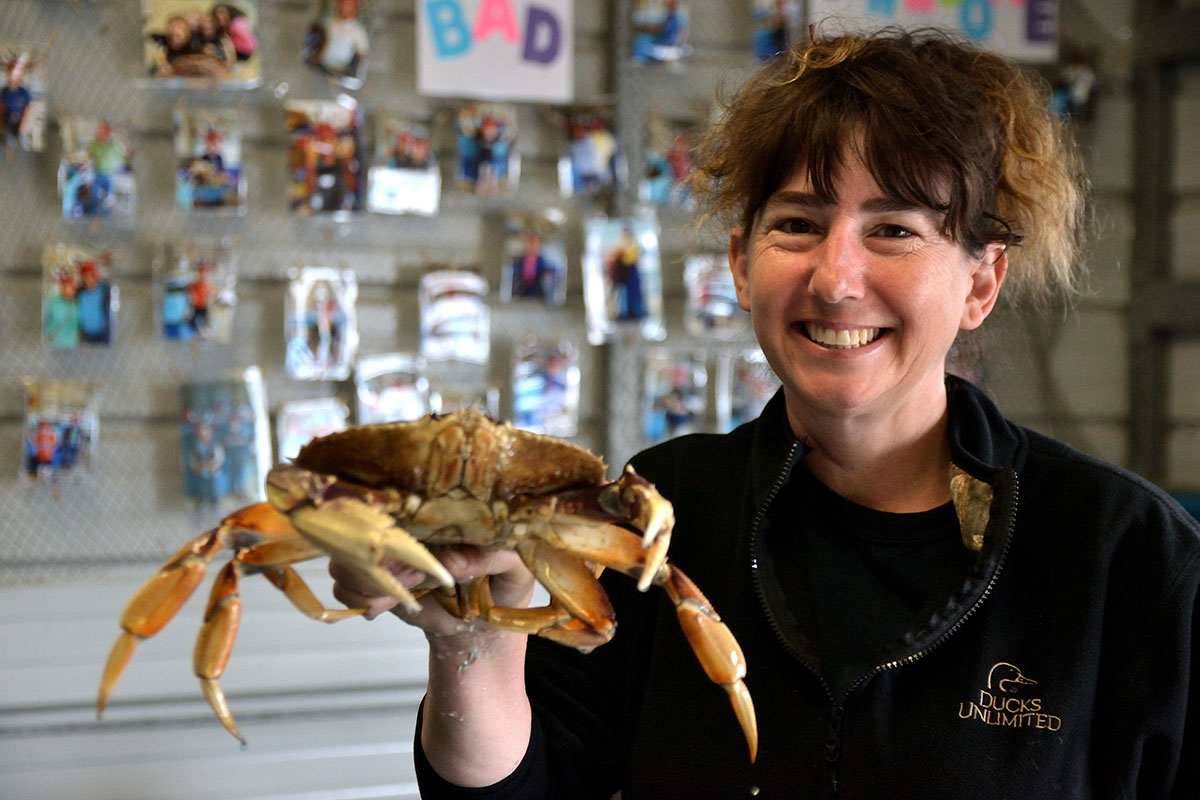
Amber Novelli poses with a live dungeness crab, part of the catch she brings to Novelli's Crab and Seafood in Florence, Oregon. (courtesy Joseph O’Connell / Oregon Folklife Network)
Laura Anderson, Amber Novelli, and Terry Hartill are small-scale seafood entrepreneurs. Amber and her husband fish from two boats, the Midnight and the Aquarius. They bring their catch directly to customers at Novelli’s Crab and Seafood, a small floating seafood market in Florence. “When people come to the coast, they're looking for fresh fish,” says Amber. “They're not looking for something that is frozen, that could be farmed, that could be anything. You want what is caught here.”
Laura owns Local Ocean, an upscale restaurant and market on Yaquina Bay in Newport. Just across the street, fishing boats dock at Pier 5. Some of these boats are her direct suppliers. “We have relationships with over 50 different fishermen to get the catch required to feed on a day like today, in the summer, in August,” says Laura. “We might feed 900 meals today.”
And in the town of Seaside, there's a giant, glowing, neon crab. That sign marks Bell Buoy of Seaside, where Terry oversees one of the coast’s few remaining seafood canneries. “There were all kinds of canneries back in the 1800s,” he says. “There were20 canneries along the river. Now if you don't home-can yourself, in your own kitchen, where else do you get it? You have to come to people like us.”
Fishing, canning, running a restaurant -- these are all distinct business ventures. But these three entrepreneurs all have roots in seafood. Terry was born and raised in coastal Oregon, and has worked in seafood since the 1960s. Amber and her husband migrated to Oregon from Monterey, California, where Italian-American fishers have long fished squid and sardine-rich waters. And Laura’s father was a commercial fisherman; she grew up cleaning his gear and branding his buoys in the fishing community of Westport, Washington.
Keeping these family and community legacies going involves careful thought and planning. To bring fish to market, local producers navigate a dynamic set of state and federal rules. “I can imagine if we were all just out there catching with absolutely no regulations, no size limits, no amounts of what we could catch, then we would be destroying the ocean,” says Amber. “But we all have our part in what we do to keep everything sustainable.” Terry points to the complex system the governs the harvesting of razor clams. To sell them, Bell Buoy needs the correct license. “We’re the only [business] in the state of Oregon that can process razor clams,” he says.“So we're the only ones licensed to wholesale.” The diggers Terry buys from need the correct licenses - commercial human consumption licenses rather than sport licenses. And finally, the digging has to take place on the clams’ calendar, which closes for much of the summer to allow the clams to spawn.
Species-specific measures like these are standard. They foster a balance between food harvesting and ocean health. Amber wonders if outsiders to the industry understand the extent, and the rigor, of environmental regulations. “I don't know who they think writes these rules, it isn't just some redneck sitting in a hut who says ‘today you can shoot a buck’,” she laughs. “It's biologists, it's scientists. It's people that know this stuff that set us up with [regulations], and tell how you can keep a species in check.”
Like Amber, Laura is protective of commercial fishing. She’s not only a restaurant owner, she’s also studied ocean science at the graduate level. “I get really defensive when I hear too many uneducated ramblings about how the oceans are all dead, and all the fisheries are over-fished, and how we should stop all of these activities,” she says. “I know about these issues, and I just don't believe that that's true.”
The future of local seafood in Oregon depends on balancing environmental and market imperatives, a task made all the more difficult during a global pandemic. But Laura thinks the past offers a powerful model of how to move forward. “Look at our Dungeness crab fishery,” she says. “We've been fishing it the same way for over 100 years. And the crab keep coming back year after year. All of these fishing families out here that we work with have children that they want to see be able to continue [this work] into the future... I have a lot of pride in it, and I feel privileged to be born into this, and I want to see that continue.” *
Listen to the story on this episode of Earth Eats.
This story by producer Josephine McRobbie and public folklorist Joe O’Connell features the voices of Oregon-based commercial fishers and seafood entrepreneurs. O’Connell conducted the original research in August 2019 for the Oregon Folklife Network, with support from the National Endowment for the Arts.
*We were deeply saddened to learn that Amber and Kyle Novelli lost their lives in a fishing accident on June 29, 2020. Since this loss, Amber and Kyle's family have worked to keep operating Novelli's Crab and Seafood. Those wishing to support the family during this difficult time can do so through this GoFundMe fundraiser. --updated July 20, 2020.












